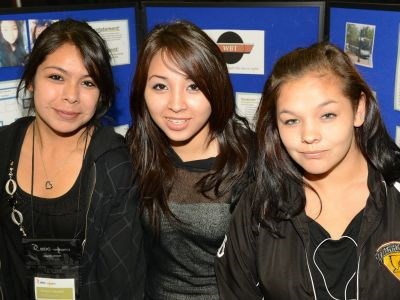When Grade 11 student Kalyne Beaudry sat down with her partners to map out a business plan, the girls wanted to do something that would serve the people of their community, the Wikwemikong Unceded Indian Reserve on the shores of Lake Huron.
Their idea is simple: set up a bus transit system that would get residents where they needed to go. But could it actually work?
“With all the gas prices rising, we thought it would be a good idea if there was a bus going around for people,” explained Beaudry, one of the students behind the Wiky Bus Transit concept. “It would save them a lot of money and it wouldn’t be as hard on the environment as people driving their vehicles.”
Beaudry and her partners, Vanessa Tabachak and Alexandria Wemigwans, all Wasse Abin High School students, got an opportunity to gauge the feasibility of their idea May 17 to 19 during the 11th annual E-Spirit National Aboriginal Youth Business Competition in New Brunswick.
Sponsored by the Business Development Bank of Canada, the competition brings together Aboriginal high school students from across the country to test their entrepreneurial mettle and encourage them to consider business as a viable career path.
The 16-week Internet-based program includes interactive business planning resources and culminates in a trade show, presentation rounds and gala awards, during which participants meet and network with other students.
“It’s kind of like Life Skills 101 for them,” said Cheryl Watson, E-Spirit project co-ordinator. “When they get there, they’re meeting peers from across Canada, and they’re realizing there are other First Nations, Métis and Inuit communities that they never would have met if they didn’t come to the gathering, so it’s really eye-opening for them.”
This year's event involved 79 teams, 37 schools and 201 Aboriginal students throughout Canada, including teams from Wasse Abin, Espanola High School, Kenjgewin Teg Educational Institute in M’Chigeeng and St. Mary’s College in Sault Ste. Marie.
Business, though the focus of the competition, is really secondary to the other skills the students acquire while there, Watson said. Teamwork, public speaking, networking, self-confidence and tenacity are amongst the attributes she sees students developing through the experience.
“It would be great if one day they want to start their own business, but they learn so much more,” she said. “It’s life-changing for these youth. We have to acknowledge the realities of where some of them come from, but we also need to acknowledge the positive that comes from even attending and travelling for the first time.”
Robina Kitchemokman, an economic development officer for Whitefish River First Nation who mentored the Espanola team, said the competition isn’t well known amongst youth, but it should be.
“I don’t think Aboriginal youth really realize the opportunity that is available to them to be exposed to youth across the country that have the mindset and the entrepreneurial spirit within themselves, and be able to bring that out and share those ideas with other youth and the BDC and the whole concept behind it,” she said.
She hopes to change that by promoting the program throughout the Manitoulin-North Shore region and engaging more students in next year’s edition.
Her mentees, Paskwa Lightning and Stanley Owl, presented a business case for Waasnode Clothing Co., a high-end clothing company that incorporates Native elements, including lines for men, women and children.
“We wanted to show our artistic side, but also design certain elements of Native culture that we would incorporate into the designs as well,” Lightning said.
Meeting other students and facing the judges were highlights for the first-time competitors, who are already planning to return with a new plan and additional partners.
“Our favourite part was just being in the E-Spirit competition,” Owl said. “We met a lot of good people from across Canada, and I want to come back next year.”
Lightning, who had been eyeing law as a future career path, is now considering business instead. The boys plan to bring their company to fruition, starting out on the powwow trail and expanding from there.
Beaudry and the Wasse Abin girls are equally optimistic they can bring Wiky Bus Transit to existence. Their next step is to vet their idea with chief and council, and they have already received plenty of support from the community.
But they also recognize the need to set out some priorities.
“Eventually, we will probably run the business plan, but it’s probably going to have to wait for a while into the future,” Beaudry said. “We do have to finish school first before we decide to get this started.”




